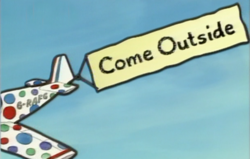Overview
The series aims to encourage young children to learn about the world around them. The starting point for each programme is something with which children may already be familiar, such as: wood, paper, boots, spiders, buses, soap and lampposts.
The two main characters are Auntie Mabel (played by Lynda Baron), and her dog Pippin, who was initially played by a female dog also called Pippin. A feature of Come Outside is Auntie Mabel's unusual mode of transport: a small aeroplane (a Slingsby T67 Firefly) with multi-coloured polka dots.
Animals
Pippin was a mixed-breed dog, half Tibetan Terrier, half Bearded Collie, roughly third generation descended from the famous American acting dog Benji and was owned and trained by the award-winning animal trainer Ann Head. Pippin was quite old at the start of the first series in 1993 and so she performed the slower but more complex moves while her grandson, Mr. Higgins, performed any physically demanding actions. [2]
Pippin retired at the end of Series 1 and Mr. Higgins took over the role of 'Pippin' entirely for Series 2 and 3. Mr. Higgins also starred as the Bakers dog for Bakers Complete pet food commercials and is still pictured on the products. He died in 2008 of old age, while Pippin died in the late 1990s. [2]
Many other animals took part in Come Outside. Specially-shot footage included snails from London Zoo, frogs at Chester Zoo, geese at Folly Farm in Pembrokeshire, rabbits at Tilgate Nature Centre in West Sussex, butterflies in the Butterfly Centre, Eastbourne, hedgehogs supplied by St. Tiggywinkles Animal Hospital and spiders from a private collection. In addition, archive shots were provided by the BBC's Natural History Film Library in Bristol.
Production details
Elizabeth Bennett created the format and characters, wrote the scripts, directed many of the programmes and produced all three series.
Two different production companies were involved. Series 1 was made by Spelthorne Productions, which has since closed; Series 2 and 3 were made by Elizabeth Bennett's production company Tricorn Associates.
Aerial views of the various locations visited by Auntie Mabel were shot by Jeremy Braben. A "Flying sequence" billing for Alan Cassidy, David Arkell and Jeremy Braben appeared on the closing credits for both seasons.
Series 1 was set in a cottage on the corner of Denham Airfield in Buckinghamshire, and was used to provide the exterior shots of Auntie Mabel's house. She would come out of the house, walk through the back garden and on to the airfield to climb into her aeroplane (a 1989 Slingsby T67C Firefly registered G-RAFG). The interiors were shot at Capital Studios in Wandsworth, South West London.
Series 2 was shot entirely on location, including the interior of Auntie Mabel's house — except the bathroom in the "Spiders" episode, which was shot in a studio. The cottage at Denham Airfield was now occupied, and so a new location had to be found. An empty cottage on a farmland in Harefield in Western Greater London was rented. To allow for the change of location to be incorporated into the show's continuity, a programme about moving house was shot to link the two locations, which makes the first series the third chronologically. The plane (now a 1988 Slingsby T67C Firefly registered G-BOCM) was kept in a field nearby.
Series 3 was commissioned two years later and was also shot at the cottage in Harefield. A much older plane (A 1983 Slingsby T67M Firefly registered G-SFTZ) was used, now featuring a spiralled propeller
In every episode, Mabel ventures outside and this involved shooting in many locations in the United Kingdom, such as a pencil factory in Keswick, the manufacture of Wellington boots in Dumfries, a pottery in Stoke, growing bulbs and attending the annual flower parade in Spalding, Lincolnshire and making brushes in Portsmouth.
Sometimes Auntie Mabel's adventures stayed closer to home. For example, the episode "Buses" was filmed around the Ruislip area of North London. Scenes were also shot in Woodley, Berkshire, in the retail precinct and in the veterinary clinic.
In the episode "Marmalade", Auntie Mabel flies to Seville to visit an orange grove. Shooting was restricted to the one day on which the oranges were ready for harvesting. This was only known with very short notice and consequently arrangements to fly out were made at the last minute. It happened well outside the main production period, by which time Lynda Baron was committed to other acting work and unavailable to travel to Seville. To make it appear that Auntie Mabel had visited the orange grove, Baron was recorded in the studio against a blue-screen background while a body double was used for reverse angle shots of her in Spain.
Animation sequences for stories, songs and skits was done by Penny Holton, Touch Animation, Really Animated Pictures and Ealing Animation (occasionally).
